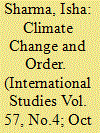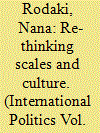| Srl | Item |
| 1 |
ID:
175355


|
|
|
|
|
| Summary/Abstract |
As globalization gained currency in international politics, multilateral negotiations increasingly expanded their scope to include environmental issues. Still, the political dimension of environmental change remains underrepresented in international relations (IR) theorization. This article aims to focus on the theoretical fortification in the mainstream IR when it comes to transboundary environmental threats. Since the threats of climate change and environmental degradation cannot be contained within the sovereign territories of states, the state-centric conception of the political order in the conventional approaches to IR fails to respond to the threats that are planetary in nature. The article seeks to answer two questions: (a) What are the inadequacies in the realist and liberal concepts of political order vis-à-vis climate change? (b) How to destabilize the conventional assumptions of political order with the aim of making it more receptive to the concerns associated with climate change? To do the latter, the article delves into the work of Robert Cox in order to delineate his intersubjective approach, which combines the material basis of political order with social relations of production. By doing so, this approach also sheds light on the transnational variants of hegemonic power, making it a useful explanatory framework for political implications of climate change.
|
|
|
|
|
|
|
|
|
|
|
|
|
|
|
|
| 2 |
ID:
110213


|
|
|
|
|
| Publication |
2012.
|
| Summary/Abstract |
The article argues that critical International Political Economy can benefit from a trans-disciplinary approach to the role of cities as socio-economic actors in the global political economy. The constitution and exercise of agency is far from an automatic response to the global restructuring of capitalist social relations, but the product of historically and context-specific economic and extra-economic social processes and social struggles. Cities (re)emerge as subjects and objects of governance and intervention and seek to become (dis)embedded in multi-scalar networks of economic and symbolic power. In this process, they become active co-producers of the global political economy, in ways that cut across spatial scales and narrow geographical imaginations.
|
|
|
|
|
|
|
|
|
|
|
|
|
|
|
|
| 3 |
ID:
108959


|
|
|
|
|
| Publication |
2011.
|
| Summary/Abstract |
Leadership is one of the central explanatory factors for change within international organizations yet is often sidelined as a part of wider social processes or understood in the context of domestic and managerial political agency. This article adopts one of the few understandings of leadership within international organization-Robert Cox's 1969 essay on the executive head-as an analytical model for understanding leadership within global HIV/AIDS governance. It does so by applying Cox's framework of analyzing the role of the executive head in relation to the international bureaucracy, member states, and the international system to the position of the former executive director of the Joint United Nations Programme on HIV/AIDS (UNAIDS), Peter Piot. The article argues that the role of leadership transcends the agency of simply opening up the black box of international organizations and is a realm of political knowledge and agenda-setting that is integral to the formation and subsequent longevity of international institutions, alliances, and the global issues that justify their existence.
|
|
|
|
|
|
|
|
|
|
|
|
|
|
|
|